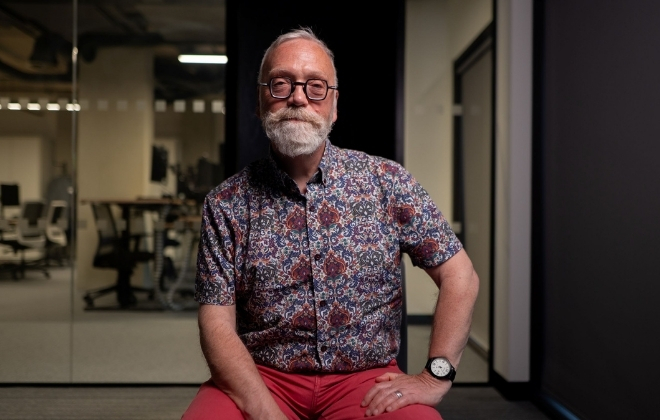
I was first diagnosed with HIV in 2006, almost two years after I began feeling unwell. It started as a gradual decline: weakness, fatigue, and loss of function in various parts of my body. I couldn’t tie it to anything meaningful. Over time, I worsened. I even collapsed on the Paris Metro.
I finally got tested for HIV on Thursday, 31st August 2006. The consultant had rung home to get in touch with me. Richard, my partner at the time (now my husband), took the call. When I got home, Richard was overwhelmed, held me in his arms and began to cry. He told me that I was living with HIV. My world fractured the moment I heard the result, and that’s how I found out. Broken, terrified, but held.
I was given two weeks to live if I didn’t begin immediate treatment. And in that moment, time stopped.
Growing up in fear
I’d grown up in an era of fear around HIV and was in my mid-20s when people started talking about the AIDS epidemic. I remember the Don’t Die of Ignorance TV ads with strong messaging in 1986, and then the leaflets dropping through our letterboxes later.
Like every other household in the UK, we received our leaflet, but I took it and hid it from my mother, so she didn’t see it, because I was not out yet. I saw tabloid headlines branding HIV 'the gay plague'. Fear was their central message. It made me, made all of us, afraid.
In university, I wasn’t out. I wasn’t part of the gay community. I knew very few gay people. And that isolation deepened my vulnerability. Even with prior knowledge of HIV, I didn’t see myself as at risk. I might have used condoms, and I might have taken precautions, but I never tested.
I decided to write the story of my diagnosis down, and Ripples: From the Edge of Life, shares my story, and that of eleven other people sharing their stories. Every narrative, though unique, shared a single thread: stigma. Some were shunned by employers. Others by their family. One man, Danny, his father, never spoke to him again when he learned his son had HIV.
To find out more about the different lived experiences of HIV, you find a copy of the book on Amazon.
Quote textThis is the cruel irony: effective HIV treatments have made HIV more manageable, but the lingering stigma still kills. Not bodies, but spirits. Stigma eats away at mental wellbeing. At dignity. At the right to live without fear.
Stigma in health care
I learned how HIV stigma lingers even in healthcare settings. I went to the same dentist for years, and she asked if I was on any new medication. I produced a list of my medications, and she returned clutching a medical encyclopaedia in one hand. She paused and whispered, 'You know this is HIV medication, right?' I nodded. 'Okay, I can only treat you at the end of the day,' she said. 'I need to clean and sterilise the surgery before the next patient.'
My trust in her vanished. I thought, if she can't guarantee the cleanliness of the dental practice during the day, how safe is my care? I walked away and never returned.
HIV still impacts lives in 2025, and we must never assume the fight is over. Because despite science, funding, and progress, discrimination still blocks doors: in clinics, at work, among friends, yes, even in family homes.
We need broader education. We need people to know that if you are on treatment and your viral load is undetectable, you cannot pass the virus through sex. That’s the message we need loud and clear.
That’s why I keep talking. I volunteer. I speak for Terrence Higgins Trust as an advocate. I write. Because Ripples isn’t just a book, it’s a snapshot of people’s lived experience, then and now.
And now you have my story. So go out and share it. We can end stigma. We can end fear. We can end isolation. We can end new cases of HIV. But only if we raise awareness and speak with compassion. Only then will these ripples become waves of change.



